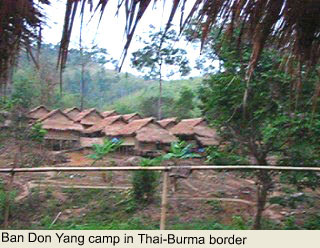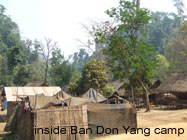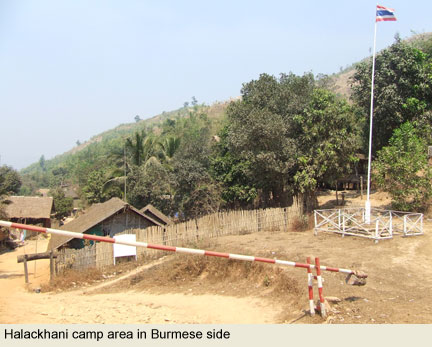Published
Tuesday, June 26, 2007 - 21:45
Deforestation and Burmese refugees
Former Thai Prime Minister Thaksin Shinnawatra during his tenure wanted to make a distinction between the Thai society and Burmese refugees by forming the Person of Concern (POC) groups, who had been granted refugee statues by the UNHCR. They were sent from Bangkok to the camps in the border as of 2004. This approach was thought to have caused more damage to the Thai Royal National Park .
 Former Thai Prime Minister Thaksin Shinnawatra during his tenure wanted to make a distinction between the Thai society and Burmese refugees by forming the Person of Concern (POC) groups, who had been granted refugee statues by the UNHCR. They were sent from Bangkok to the camps in the border as of 2004. This approach was thought to have caused more damage to the Thai Royal National Park .
Former Thai Prime Minister Thaksin Shinnawatra during his tenure wanted to make a distinction between the Thai society and Burmese refugees by forming the Person of Concern (POC) groups, who had been granted refugee statues by the UNHCR. They were sent from Bangkok to the camps in the border as of 2004. This approach was thought to have caused more damage to the Thai Royal National Park .“Don’t the Burmese refugees destroy the forests when they have no income and insufficient support? How do refugees survive without any income? Must they eat only bean curry round the year?”
The refugees cannot very well survive with the support of the international agencies such as the TBBC. This has been the main cause of deforestation on the border of Burma and Thailand . About 6,000 the refugees in two camps in Ban Don Yang, BDY in Thailand known as the Karen camp and Halockhani in Burma known as the Mon camp have been relying on national forest resources.
Last month, officials of the Swedish embassy from Bangkok went to the BDY camp on the southern Thai-Burma border to interview the war ravaged political refugees for the purpose of resettlement. However, some Karen refugee families, on that particular day had gone outside the camp to find food and vegetables. They missed the opportunity of a better life. Some say that they do not want to go to third countries and are waiting to go back to their home village inside Burma .
Some Burmese environmentalists in BDY camp said that they are extremely worried on account of the deforestation along the border of the two countries. They have been witness to the process of deforestation which includes setting on fire and burning the forest from a total lack of awareness.

“Some my neighbours go outside of the camp to find food including many kinds of vegetables, bamboo shoots and fruits,” Mr TT, an environmentalist who has earned a certificate from Thai Environmental Society after a workshop in Bangkok, said. “Some of them have been hunting birds, wild animals and other sea food such as small prawns and frogs. Not only refugees but Thai milita forces guard the camp.”
Some, TT said, went outside the camp to collect many kinds of orchids to sell them to Thai nationals for survival. Orchids in the camp are cheap. A good quality plant is worth 100 Baht, and a lesser quality of orchid is about 20 Baht a plant. “You can see many kinds of orchids hanging in front of their houses and you can buy them.”
The refugees hunting wild animals such as pig, tiger, bear, deer, monkey and goats must go deep inside jungles in Burma in the mountain ranges of Tanesserim Division. It is about a day’s trek from the camp. A big tiger was killed last April by a Mon refugee hunter and it sold for 150,000 Kyat in Burmese currency. The tiger, sources from the Mon camp, believe was sent to the China-Burma border where the price is higher then in the Thai market.
In the two camps one kilogram of goat meat is for 70 Baht, cat meat is 50 Baht, pig is 50-60 Baht, dear is 80 Baht, bear is 50-60 Baht frog meat is 60 Baht, monkey is 50 Baht, small animals are 50 Baht, and small pawns are for 50 Baht.
“The price of wild meat before the POC group arrived from Bangkok was cheap,” a Mon refugee from Halockhani said. “We now cannot afford to buy meat at such a high price.” The woman said that in contrast, the price of wild meat in Three Pagoda Pass , TPP town market is two or three higher than in the two camps. The refugee hunters try to sell the meat in the TPP market to make more money.
Therefore the refugees in Karen camp and internally displaced people or IDPs in the Mon camp have to rely on forest produce.
TT said that one litre of wild honey is 125 Baht. The wild honey, local people believe, is effective in making traditional medicine. Karen refugee honey collectors go to deep inside forests and climb big trees to get the honey. They take risks doing it.
Smuggling of forest produce into Thailand including orchids is leading to deforestation.
 The houses in Mon camp are built mostly of timber while the smaller homes in the Karen camp are made of bamboo. The illegal price of one bamboo is 8 to 10 Baht. “You can order neighbours to get bamboos when you need to repair your house,” TT said. “However, big and strong bamboos cannot be found in areas near the camp.”
The houses in Mon camp are built mostly of timber while the smaller homes in the Karen camp are made of bamboo. The illegal price of one bamboo is 8 to 10 Baht. “You can order neighbours to get bamboos when you need to repair your house,” TT said. “However, big and strong bamboos cannot be found in areas near the camp.”Most of refugees in BDY go shopping to the Mon camp. Especially, they go there to party. Drinking in Karen camp is banned, according to UNHCR officers, due to problems arising when they get drunk. “You can go drink outside the camp then come back, but not drink here,” one slip holder who was sent back last October to the border camp from Kanchanaburi and Sangkhlaburi and is waiting for resettlement to the third country, quoted the UNHCR as saying.
The BDY camp is situated in the middle of Thai National Forest .
The deforestation may be a result of ill-treatment of refugees by Thai authorities. The situation the refugees are in, leads to deforestation when they flout orders not to go out of the camp and contact the SPDC opposed media. Insufficient support to them is another key factor. They have to go outside the camp to find wood to make charcoal because the TBBC does not provide them enough of it.
UNHCR wants to create jobs for Burmese refugees by encouraging Thai businessmen and Thai authorities to build factories near the camps and to allow the refugees to work in them. This suggestion has been ignored by the Thai authorities because of apprehensions of complaints regarding controversial use of refugees as labourers.
Creation of jobs for refugees is the best way to save and protect the forest along the border of the two countries. Waiting for a peaceful solution to Burma ’s political problem in order to send the refugees back home is a far cry now.
“You cannot see any big trees in the area around the Mon refugee camp which was built about 13 years ago,” Mr TT said.
Thai authorities have to resort to checks and balances in dealing with the environmental and social problem concerning Burmese refugees. Focusing on just social problems will cause deforestation along the border.


